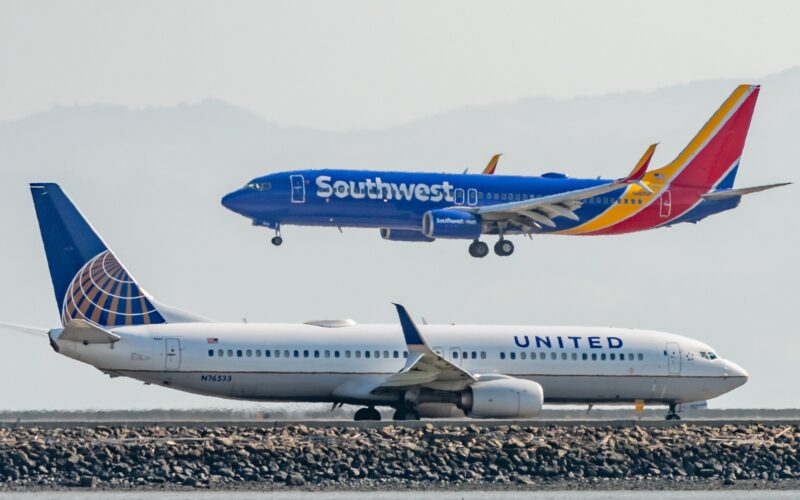United Airlines and Alaska Airlines aircraft were forced to abort landing attempts at San Francisco International Airport (SFO) due to a Southwest Airlines Boeing 737 crossing two active runways at the airport.
The incident occurred on May 19, 2023, when a Southwest Airlines Boeing 737-700, registered as N262WN, was taxiing to depart on its regularly scheduled flight WN1179 from SFO to San Diego International Airport (SAN).
At the same time, a United Airlines Boeing 737 MAX-9, registered as N37548, was coming in to land at SFO on runway 28 left. The 737 MAX-9 was operating flight UA277 from Washington Dulles International Airport (IAD) to SFO, when the Southwest Airlines 737-700 crossed runway 28 left, forcing the United Airlines aircraft to initiate a go-around. The lowest altitude of the 737 MAX-9 was 225 feet (68.58 meters) at 9:10 AM local time (UTC -7), according to flightradar24.com data.
At 9:10 am local time (UTC -7), the Southwest Airlines Boeing 737-700 had just crossed the same runway on which the United Airlines 737 MAX-9 was meant to land.
Two minutes later, an Alaska Airlines Airbus A321neo, registered as N928VA, operating flight AS553, also between IAD and SFO, was forced to abort its landing attempt. The lowest altitude of the A321neo’s first landing attempt was 425 feet (129.5 meters), as it initiated a go-around at 9:11 AM local time (UTC -7).
At the same time, the Southwest Airlines Boeing 737-700 was crossing runway 28 right.
The United Airlines Boeing 737 MAX-9 and Alaska Airlines Airbus A321neo landed at SFO without incident at 9:24 AM and 9:28 AM local time (UTC -7), respectively. Meanwhile, the Southwest Airlines flight to SAN landed safely at its destination at 10:27 AM local time (UTC -7).
Over the past few months, the United States (US) has witnessed several near-miss incidents at multiple airports across the country, prompting authorities including the Federal Aviation Administration (FAA) and the National Transportation Safety Board (NTSB) to react.
The FAA announced it will invest $100 million in 12 US airports following the analysis completed during the agency’s Runway Incursion Mitigation Program.

